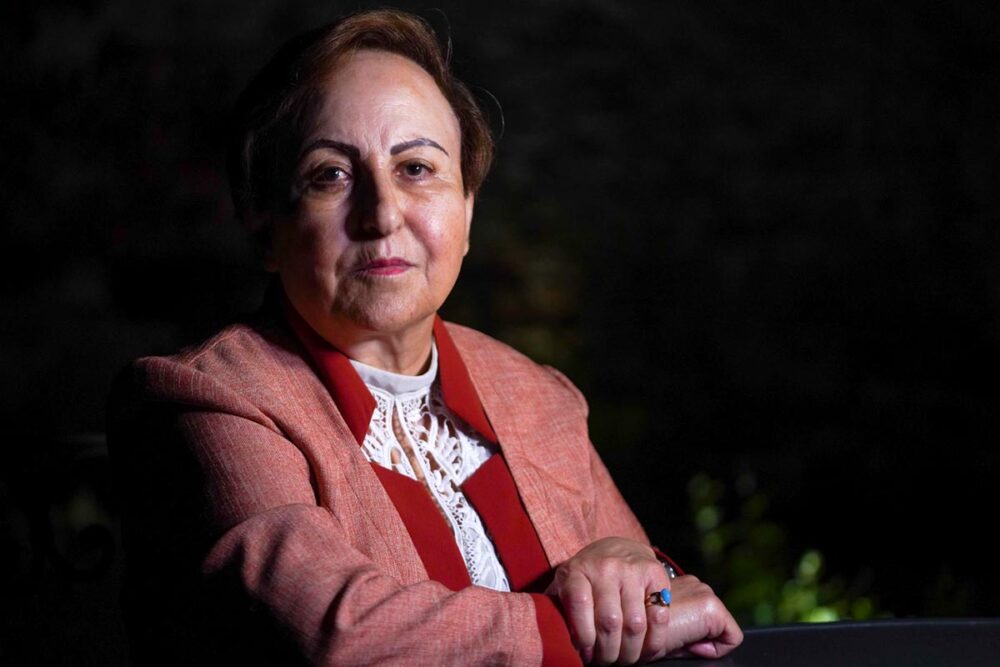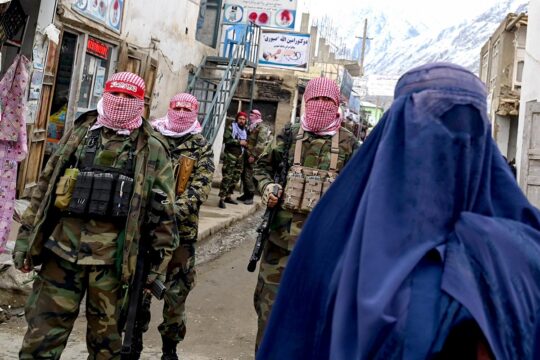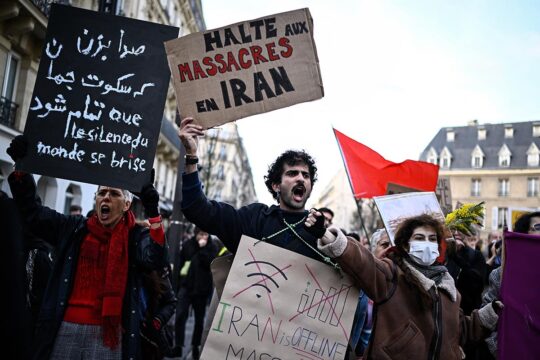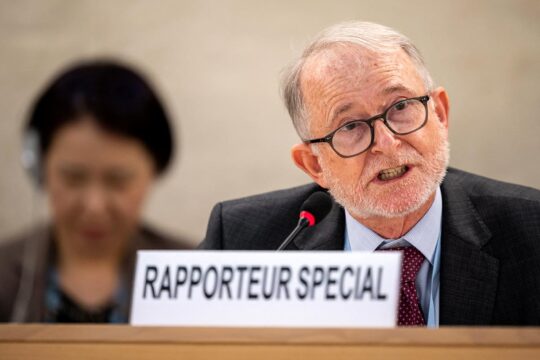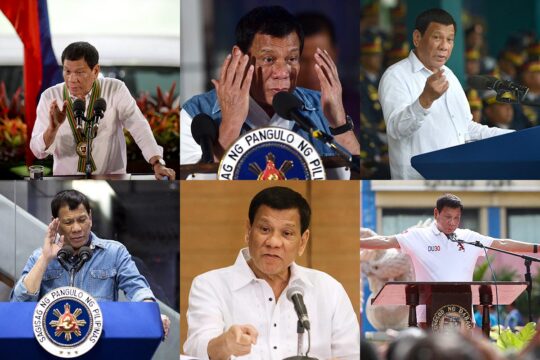JUSTICE INFO: September 16, 2024, marks the two year-anniversary of Mahsa Amini’s death after being arrested for “wearing inappropriate attire”. What does her death mean to you?
SHIRIN EBADI: The murder of Mahsa Amini is a murder that unfortunately has always happened in Iran. The reason I say “unfortunately” is because Mahsa was not the first girl, nor the last woman, to be killed by government agents because she wore the hijab in a way that was deemed against the law. In my view, Mahsa’s murder by the government demonstrates the naked violence of a tyrannical government and its refusal to heed the law and humanity.
This murder goes against the international agreements signed by the Iranian government. Iran is a signatory to international human rights conventions and must implement them. The first of these obligations is to value life. Under no circumstances do government representatives have the right, whatever the circumstances, to act outside the framework imposed on them by law. No international law, nor even Iran’s domestic law, authorizes the murder of a citizen without trial, in the manner in which it was carried out. So this was murder, under both national and international law. And since, unfortunately, such murders occur systematically and continuously in Iran, they can be considered crimes against humanity.
Following Amini’s death and the “Woman Life Freedom” movement, with hundreds of protesters killed and thousands more arrested and jailed, what is the current state of women’s lives in Iran?
The status of women has not changed. During this period, no law was passed in favour of women. The situation is still discriminatory. Women are still discriminated against in the labour market. The widespread poverty that has occurred in Iran affects women more than men, and we see women who are heads of households living and suffering very difficult situations without the state, or any of the governments that come and go, paying any attention.
As for the issue of wearing the headscarf, it continues to claim victims, as we saw again recently when Arezou Badri [a 31-year-old mother of two who has become paraplegic after being shot at by security forces while she was driving in her car on July 22, 2024] ended up on a hospital bed because of her hijab. So the situation unfortunately continues as it used to.
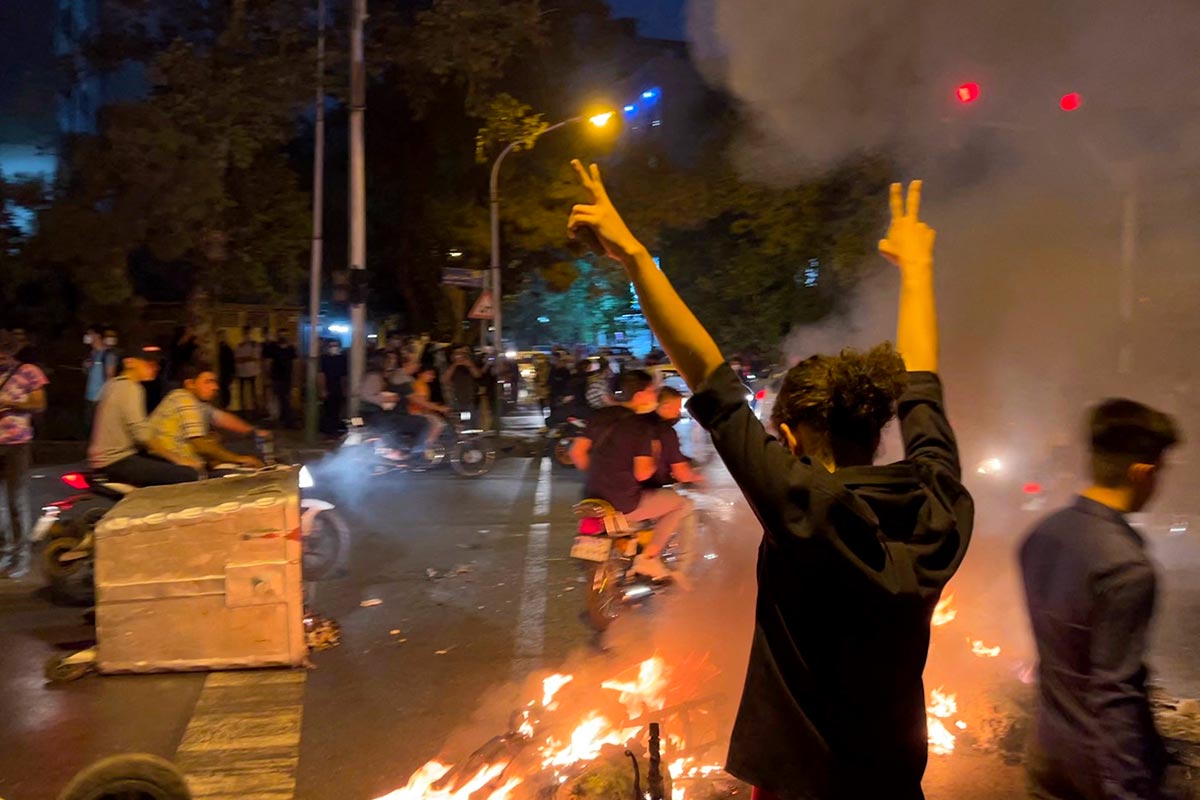
On the issue of hijab, some Iranian women are resisting and not wearing it in the streets, in the public sphere, without being punished or imprisoned. Is this correct?
This was also the case before. Since the “Stealthy Freedoms” campaign was launched [in Iran in 2014 by journalist Masih Alinejad], we’ve seen many photos and videos of women outside their homes without wearing their hijab. What’s happening now is the same as before, but it is more widespread: there are more of them.
Wherever, whenever there are no police, women get rid of the compulsory hijab at the first opportunity, but if and when the police or Gasht-é-Ershad [the religious morality police] finds out about it, their behaviour towards women is extremely savage.
As a lawyer, then a judge, you were the first woman in the history of Iranian justice to preside over a court. You stayed in Iran for many years after the Islamic revolution of 1979. What types of discriminations have you witnessed over the years?
I can only list a small number of the discriminatory laws that were imposed on Iranian women after the Islamic Revolution, because there were so many of them. First of all, the blood money (diyeh) of a woman is worth half that of a man, which means that if my brother and I go out together in the street and a car hits us and we are both injured or killed, the compensation due to my brother will be double the one due to me, because I am a woman.
As far as inheritance law is concerned, the inheritance a woman receives on the death of her husband will be half the inheritance a man receives after his wife's death. The inheritance a daughter receives from her parents will be half that received by a son, her brother. Or when the father of a child dies, the handling of that child’s property goes to the grandfather. Imagine a mother who has bought an asset, such as a house, for her child. As long as she is with her husband and they are living comfortably, there is no problem, but it is the husband, i.e. the child’s father, who has the right to rent the house, collect the rent or sell it. The mother who bought the house has no rights. And after the father’s death, the mother will not have priority, neither to be in charge of nor manage the house she bought for the child. It will be the grandfather who will have this right, which is called the right of guardianship (haq-e-velayat). Before the Islamic revolution, women had the right of guardianship over their children, but this right was taken away from them after the revolution.
The age of marriage in Iran is appallingly low: thirteen years for girls and fifteen years for boys. The age of penal responsibility is also extremely low, nine years for girls and fifteen years for boys. And there is, of course, the fact that a woman who marries sees her legal personality weakened. In certain cases, she will need her husband’s written authorization. This is required, for example, to obtain a passport or to leave the country. Also the testimony of one man in court is equivalent to the testimony of... two women. And the list goes on... There are many other discriminatory laws in Iran today. If I were to list them all, it would be like writing a thick book.
Following in the footsteps of the “Woman Life Freedom” movement, the UN Independent International Fact-Finding Mission on the Islamic Republic of Iran (FFMI), established in November 2022 by the Human Rights Council, ruled that the Iranian regime’s repression of demonstrators, particularly women, constituted a crime against humanity. What do you think?
I agree 100% with this finding. But the answer to crimes against humanity lies in a special court, the International Criminal Court (ICC). For a government to be tried for crimes against humanity, it must either agree to be a member of the ICC, which the Iranian government has not accepted, or the UN Security Council must bring the case before the Court. But we know that Russia and China – because of their economic interests with Iran – are defending Iran, so this road is also a dead end. That’s why this case has not yet been referred to the ICC. But I promise you that, in a not too distant future, we will see Iranian government officials in the dock at a trial.
The UN FFMI also took the view that, in the absence of national justice, UN member states should apply the principle of universal jurisdiction, which potentially means arresting and prosecuting agents of the Iranian regime when they’re abroad. What are your views on this?
If a country is not a member of the ICC, what do you do? Hence the idea of adopting the principle of universal jurisdiction. It means that certain countries have adopted laws under which, if a crime against humanity is committed and the aggressor is on their soil, they have the right to arrest him.
This is what happened with the trial of Hamid Nouri. Some thirty years ago, this man was accused of crimes against humanity and complicity in crimes against humanity committed in Iran in the 1960s. The Swedish government had already approved a universal jurisdiction law, so as soon as he set foot on Swedish soil, Nouri was arrested, tried and found guilty before the highest courts and sentenced to life imprisonment. But the principle of universal jurisdiction does not apply to all countries; it must be enshrined in their laws...
You are one of the signatories of a petition on gender apartheid. What is gender apartheid, and does it apply to the current situation of women in Iran?
Apartheid means fundamental discrimination that completely excludes a person or group of people from humanity and equality. This problem was first officially recognized in the case of South Africa. At the time, the International Convention on the Suppression and Punishment of the Crime of Apartheid was adopted by the UN General Assembly for South Africa, and many countries signed it. This Convention mentions ethnic origin and race, as it was conceived in relation to the apartheid that existed in South Africa. The word “gender” does not appear.
However, after the events that took place in Iran, Afghanistan and in certain predominantly Islamic countries, the feminist movement came to the conclusion that apartheid should not be based solely on race. Is there a difference, for example, between the way they treat women in Afghanistan and the way they treated black people in South Africa during the apartheid period? People who weren’t white suffered the same ordeal. So this needs to be corrected, but for gender apartheid to be officially recognized under international law, the Convention needs to be amended. The Convention itself states that any of the countries that have signed it can write a letter to the UN Secretary General and ask for the word “gender” to be added.
On this basis, I asked several countries, including France, Norway and Italy: since you are members of this Convention, and the feminist movement in your countries is powerful, please ask for the word “gender” to be added. I hope that it will be followed up. But that is not yet the case.
If a government has the courage and initiative to make this request, then the UN Secretary General will have the duty to raise this issue and the countries that have joined this Convention will have to vote to officially add the word “gender”. If that happens, then governments like Afghanistan’s Taliban or the government of the Islamic Republic of Iran could be tried for the crime of apartheid.
Can and should change and reform come from within Iran?
The Islamic Republic has to change because a government based on an Islamic ideology cannot implement gender equality. Our problem stems from the constitution. According to the constitution, the official religion of the Islamic Republic of Iran is Islam, and again according to the constitution, the laws passed by parliament must comply with the Islamic sharia. So when a law is approved, it must be sent to the Council of Guardians to decide whether or not the text is compatible with the Sharia. This Council of Guardians is made up of 12 members [appointed for six years], including six Islamic clerics and six jurists [elected by Parliament on the recommendation of the judiciary, which itself reports to the Supreme Leader].
But only the clerics on the Guardian Council can express an opinion on whether or not laws comply with Islamic Sharia law. The six jurists can’t say anything on this subject, they don’t have the right to speak. These six clerics who have to give their opinion on conformity with the sharia are directly appointed by the Supreme Leader [the head of state of the Islamic Republic of Iran], so one person’s opinion, i.e. the Leader’s opinion, is the Islamic sharia, right? Inside the country itself, Iran has many theologians (mojtahedeen) whose religious beliefs are completely different from those of the Supreme Leader, but as they are not part of the political power, their words have not been heard.
As for the Supreme Leader, he is appointed for life. And he is not even elected directly by the people, but by high-ranking clerics, the [88] members of the Assembly of Experts. Now tell me, in such a system, where is the place of the people? Where is the will of the people? Our fundamental problem is therefore the political structure of Iran. That’s why I say that as long as this government works with this structure and with this constitution, there’s no way we can have a better situation.
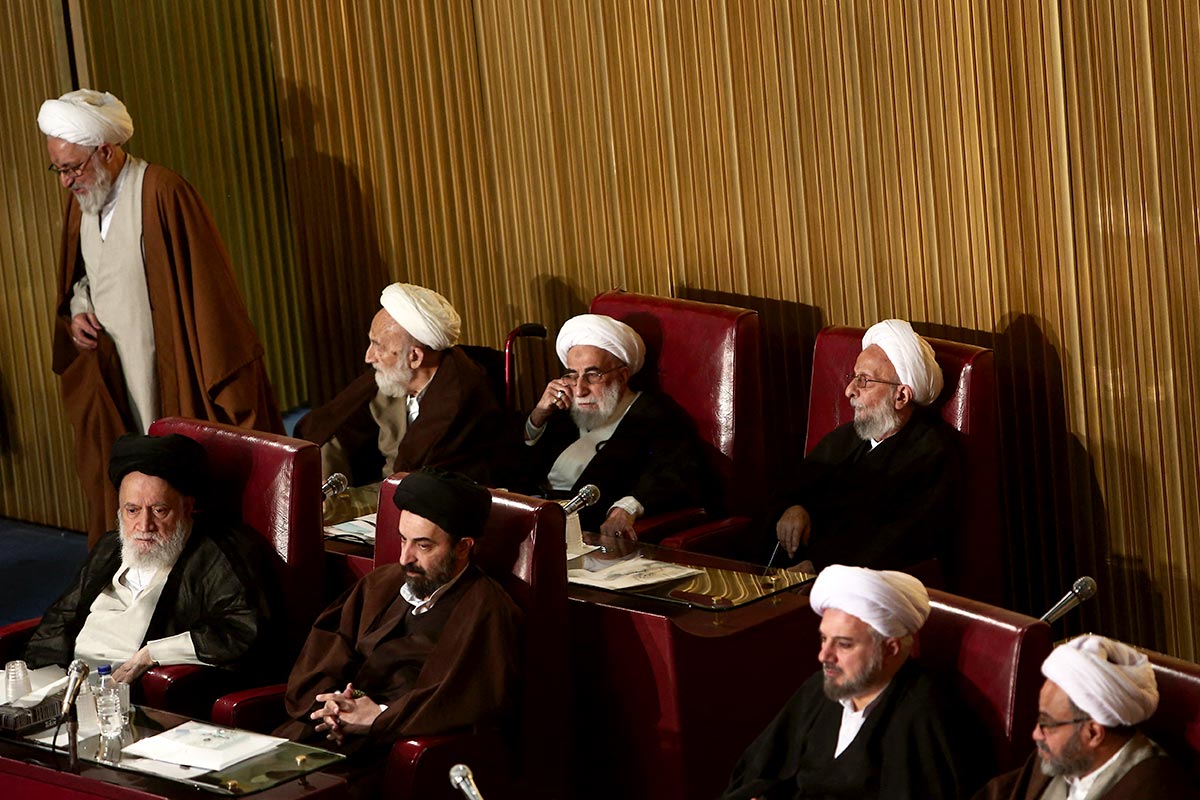
Do you think that Iranian women will be able to resist the regime’s threats with their current struggle?
To a lesser degree, we can prevent the situation from getting worse. But let’s not delude ourselves. With this political structure, with this framework, this state order, we can’t do anything, and that’s why day after day we see the gap between the Iranian people and the government growing wider and wider.
You have said that Islam must be compatible with equality and human rights: Can you tell us more?
Islam, like any religion, has different interpretations. You see that in Europe, one church marries same-sex couples, meaning it accepts it, while another church rejects it; one church accepts abortion, another strongly rejects it. It’s the same with Islam. The situation of women in Islamic countries is very different: not all countries are the same, and this shows that Islam has different interpretations. The problem here is theocracy. The problem is when religion takes political power and wants to speak and decide. That’s what happened in Iran: the opinion of one person [the Supreme Leader] becomes Islamic sharia law and is imposed on everyone. This is also what happened with the Taliban: the opinion of the Taliban becomes Islam.
Repression in Iran targets not only women and political dissidents, but also religious and sexual minorities. Is this another kind of apartheid?
If we consider the word “apartheid” in its broadest sense, apartheid is any form of discrimination suffered by a group. But the reason why gender apartheid is now a much-discussed topic in Iran and around the world is, in my opinion, because it affects a very large number of people and exists in every country, to a greater or a lesser extent. Women make up half of society. When you talk about gender apartheid, it means that you are discriminating against half of society.
There is no doubt that sexual and gender minorities (LGBTQ+) must have the same rights, all the rights enjoyed by the rest of society. The reason why the term apartheid of gender identity or sexual orientation is not used is explained by the percentage that these minorities represent within society.
But if we want to understand apartheid in its true sense, we have to say that apartheid means discrimination. And any kind of discrimination is reprehensible, whether it is based on gender, gender identity or the sexual orientation of the population.


